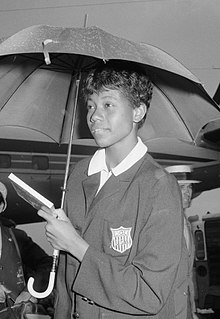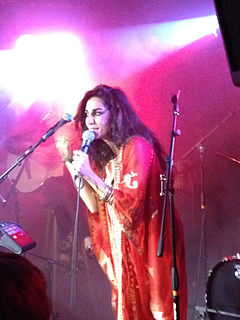A Quote by Madeleine Albright
Women are more than 50% of almost every country in the world. Countries rob themselves of the resources of women if they keep them as property. It isn't that women can't find work. It's just that women don't get paid for their work and are not recognized properly. It's something that has to be on the international agenda all the time.
Related Quotes
Personally I get so much of my inspiration from women in other countries, so I don't feel like American women are the leaders and I don't agree with the notion that Americans can accomplish more or do more. But I do think that what we can uniquely do here in America is mobilize and galvanize a lot of these ideas and resources. It's a war of ideas. We, Islamic women, are very well supported in this country by institutions, academic and nonprofit, that are already in the field endorsing women's rights and tolerance. The women in other communities have been the pioneers in this work.
Women need the education and training, particularly since more and more women are heads of their households, as much or more than anybody else...And it's hard for them to leave their families when they don't have somebody to take care of them....It's a vicious cycle that's affecting women, particularly in a part of the country like this, where mining is the mainstay; traditionally, women have not gone into that line of work, to say the least.
I am a fierce advocate for the economic empowerment of all women. In the Congress, I am one of the leaders of an initiative called 'When Women Succeed, America Succeeds.' It is an economic agenda for women aimed at making sure women have equal pay for equal work, paid sick leave, and affordable child care.
As indicated by the increase in maternal mortality in 2010, right now it's more dangerous to give birth in California than in Kuwait or Bosnia. Amnesty International reports that women in [the United States] have a higher risk of dying due to pregnancy complications than women in forty-nine other countries (black women are almost four times as likely to die as white women). The United States spends more than any other country on maternal health care, yet our risk of dying or coming close to death during pregnancy or in childbirth remains unreasonably high.
What business needs now is exactly what women are able to provide, and at the very time when women are surging into the work force. But perhaps even more important than work force numbers is the fact that women - who began this sweeping entry in the mid-seventies - are just now beginning to assume positions of leadership, which give them the scope to create and reinforce the trends toward change. The confluence is fortunate, an alignment that gives women unique opportunities to assist in the continuing transformation of the workplace.
People think that women don't negotiate because they're not good negotiators, but that's not it. Women don't negotiate because it doesn't work as well for them. Women have to say, 'I really add a lot of value, and it's in your interest to pay me more.' I hate that advice, but I want to see women get ahead.
I think empowerment of women is exactly what's happening now, with women being portrayed as human beings, and not just black and white. Men can be the anti-hero all the time, and it's cool, but when women are, they're twisted or messed up or something is wrong with them. I think it's just about portraying women in the world as equals to men, and vice versa.
I nodded. A man's world. But what did it mean? That men whistled and stared and yelled things at you, and you had to take it, or you get raped or beat up? A man's world meant places men could go but not women. It meant they had more money,and didn't have kids, not the way women did, to look after every second. And it meant that women loved them more than they loved the women, that they could want something with all their hearts, and then not.
Women in their thirties are much more nervous about dating. They feel time is 'running out for them. They want to get married and have a family. The women I see in their forties and fifties know what they want. They are amazing, confident women with good jobs, but they are just struggling to find someone who is their equal.












































